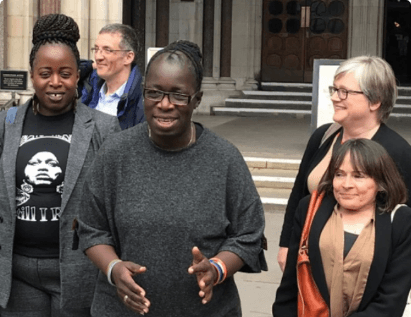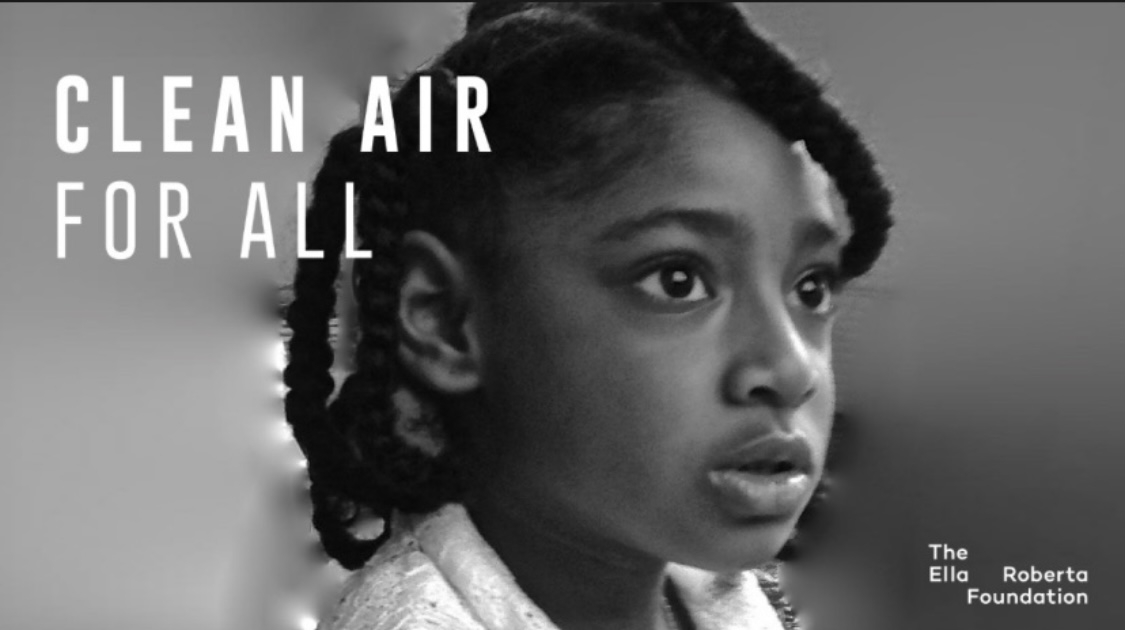INQUEST & CORONER’S REPORT

INQUEST & CORONER'S REPORT
In December 2020, London, in what is believed to be a global first, Deputy Coroner Phillip Barlow ruled that Ella Adoo Kissi Debrah died as a direct result of air pollution. Several months later, the Coroner issued a Prevention of Future Deaths (‘PFD’) report which expressed his concern about the lack of legally binding air quality targets, lack of public information and appropriate doctor training.
Inquest:
In what is believed to be a global first, Deputy Coroner Phillip Barlow ruled that Ella Adoo-Kissi-Debrah, a 9 year-old girl who lived just 25m from the South Circular in South London, died in February 2013 as a direct result of air pollution.
Philip Barlow said he believed air pollution made a “material contribution to Ella’s death”. She was exposed to levels of nitrogen dioxide and particulate matter in excess of World Health Organisation guidelines. The level of air pollution she was exposed to was therefore excessive. The principal source of her exposure was traffic emissions.
He noted also that there was a “recognised failure to reduce the level of nitrogen dioxide to within the limits set by EU and domestic law, which possibly contributed to her death”. He added that Ella’s mother “was not given information about the health risks of air pollution and its potential to exacerbate asthma”. The lack of information also possibly contributed to her death.
The Coroner ruled that “Air Pollution was a significant contributory factor to both the induction and exacerbation of her asthma”.
He concluded: “Ella died of asthma contributed to by exposure to excessive air pollution.”
The medical cause of death was listed as:
- 1a) acute respiratory failure
- 1b) severe asthma
- 1c) air pollution exposure
Ella’s mother, Rosamund Adoo-Kissi-Debrah, said immediately after the verdict that she was in “absolute shock”.
“Up until the point when the coroner says his verdict, you’re not sure it will happen. And then in the moments afterwards, as it sinks in, you think about the amount of change it can bring to so many children. I thought about the children all around the world who this might help, because I receive letters from people as far away as India about the problems they face with air pollution. It’s going to take a while for me and my family to absorb this news; it’s been such a journey to get to this point.”
She added: “We’ve got the justice for Ella which she so deserved, but there are still illegal levels of air pollution now, as we speak, so this matter is far from over. What I would like to see happen as a result of this inquest is better education about air pollution and for more serious steps to reduce pollution to safe levels. We talk about working toward cleaner air in eighteen months or several years’ time, but that’s not fast enough. I would like to see a public awareness campaign undertaken. There needs to be clear and concise information, so people can understand it. I still think there’s a lack of understanding about the damage it does to young lungs, especially.”
Rosamund’s lead lawyer at Hodge Jones & Allen, Jocelyn Cockburn said:
“When Rosamund came to see me nearly 5 years ago she was determined to find out why Ella died and I am so pleased for her and her children that she now has the answer to that important question. I am sure she will take time to absorb the Coroner’s detailed reasoning but his conclusion is clear – that excessive levels of air pollution caused her death.
“It has been a long legal journey and throughout we have been met with scepticism that it is possible to link air pollution to an individual death. I have always found this reticence surprising given the universal acknowledgement that air pollution causes tens of thousands of deaths in the UK every year. This case has broken through that mindset.
“Because of this ruling, air pollution can no longer be ignored and overlooked as a factor that has a real impact on individual human beings, especially the vulnerable. The two week investigation into what happened to Ella brings the air pollution debate right down to the micro-level. I was shocked to learn that air pollution had never been examined in a coroner’s inquest before or listed as a cause of death. I now expect that air pollution will be examined in the context of other deaths.
“In terms of raising awareness of air pollution, this case has told the human story behind the statistics and makes it much more difficult for the authorities to ignore the call to clean up our air. That is Ella’s legacy. ”
“I would like to pay tribute to Rosamund and her family for the determination they’ve shown in bringing Ella’s story and such a public health issue to the fore at great personal cost. I don’t think I’ve met anyone stronger than Rosamund and I am proud to have worked with her for so many years”.
***Full press release available here.
Prevention of future deaths report
In April 2021, Philip Barlow, Assistant Coroner for South London, made the report following the Inquest into Ella’s death which concluded in December 2020. The report will be sent to Government departments and other bodies.
The Coroner’s report identified three areas of specific concern (at Section 5 of his PFD Report) for which there is an ongoing risk to members of the public of illness and death from air pollution.
The first recommendation is aimed at the three government departments involved in the inquest (Defra, DfT and DHSC). The Coroner said that the Government needed to pay particular attention to reducing air pollution levels to concentrations safe for human health. The PFD report identifies as its first concern:
(1) “The national limits for Particulate Matter are set at a level far higher than the WHO guidelines. The evidence at the inquest was that there is no safe level for Particulate Matter and that the WHO guidelines should be seen as minimum requirements. Legally binding targets based on WHO guidelines would reduce the number of deaths from air pollution in the UK.”
This follows on from the Inquest conclusion in December 2020, in which the Coroner ruled that “the overwhelming conclusion … is the health risk caused by air pollution and the urgent need to improve air quality”. He also highlighted the need for “co-ordinated action” within the Government1 .
Key witnesses to the Inquest, including Dr Claire Holman and Professor Sir Stephen Holgate, had expressed the need for setting health-based targets for air pollution reduction.
Writing in his Reasons accompanying the PFD Report, Mr. Barlow voiced his “matters of concern” flowing directly from his conclusions at the inquest, most importantly “the undeniable health problems caused by not following the WHO guidelines in setting national air pollution targets, specifically on particulate matter”.
He said “[t]he discrepancy between national targets and WHO guidelines was central to the inquest and addressed by most of the witnesses.” Under existing law the permitted annual mean levels of PM10 are double those recommended by the WHO guidelines as the minimum requirements whereas for PM2.5 the UK legal limits are more than double the WHO guideline limits.
He continued: “There was no dispute that the level of particulate matter pollution continues to be a major issue of public health concern. The number of deaths associated with air pollution is extremely high… There is a very clear need for action to be taken to prevent the continuation of this circumstance.” 2
A second recommendation directed at Central Government Departments, the Mayor of London and the London Borough of Lewisham, relates to low public awareness of the sources of information (such as UK-Air website) about national and local pollution levels. The report states:
(2) “Greater awareness would help individuals reduce their personal exposure to air pollution. It was clear from the evidence at the inquest that publicising this information is an issue that needs to be addressed by national as well as local government. The information must be sufficiently detailed and this is likely to require enlargement of the capacity to monitor air quality, for example by increasing the number of air quality sensors.”
Mr. Barlow’s accompanying comment was:
“I am concerned at the comparatively low level of access to public information, such as the UK-Air website. Leaving this as a local issue is clearly not resulting in people accessing relevant information, and it is therefore a concern that needs to be brought to the attention of central government.”
The evidence from the inquest revealed that there was a significant lack of information available to people regarding air pollution levels in their local area. The information that was provided was insufficiently publicised and had very few subscribers. Similarly, there was a lack of public awareness around the health risks associated with air pollution and a deficit of advice about steps that can be taken to minimise exposure to air pollution. Rosamund and other witnesses at the inquest stressed the need for improved public information.
The Coroner’s final concern is that “adverse effects of air pollution on health are not being sufficiently communicated to patients and their carers by medical and nursing professionals”. Mr. Barlow identified three levels of professional organisations responsible for undergraduate and postgraduate education, as well as professional guidance who he recommends should address this failure.
(3)
- a. “Undergraduate. I am informed that undergraduate teaching is the responsibility of the GMC, Health Education England and the NMC.
- b. Postgraduate. I am informed that postgraduate education is the responsibility of the Royal Colleges, in this case the Royal College of Physicians, the Royal College of Paediatrics and Child Health, the Royal College of General Practitioners, and the NMC.
- c. Professional guidance. In this case relevant organisations are NICE and the British Thoracic Society.”
He also sent the recommendation to the DHSC and Faculty of Public Health for information.
Mr. Barlow expanded on this in his logic statement with the following:
“Air pollution was not discussed as a possible causative factor [throughout Ella’s illness] even though Ella was seen by GPs and specialists in several specialist hospitals. It is an issue that needs to be raised with a large number of organisations responsible for medical education, which I have listed in the report.”
The evidence from the inquest revealed that despite Ella having very severe asthma, the cause of which was under investigation by medical specialists in several hospital air pollution was never considered and therefore Rosamund was not advised of steps that could have helped reduce Ella’s exposure.
This recommendation echoed his concern raised in the Coroner’s Conclusions in December 2020 when he said, “There was, therefore, an alarming disconnect between the message being sent out about the overall health effects of air pollution, including the number of deaths it causes, and the actual advice being given to patients and the public.”
These three recommendations point to a need for the Government and other public bodies to take a more health-focused approach to air pollution. Health should be prioritized in order to prevent future unnecessary deaths from air pollution.**Full press release available here.


